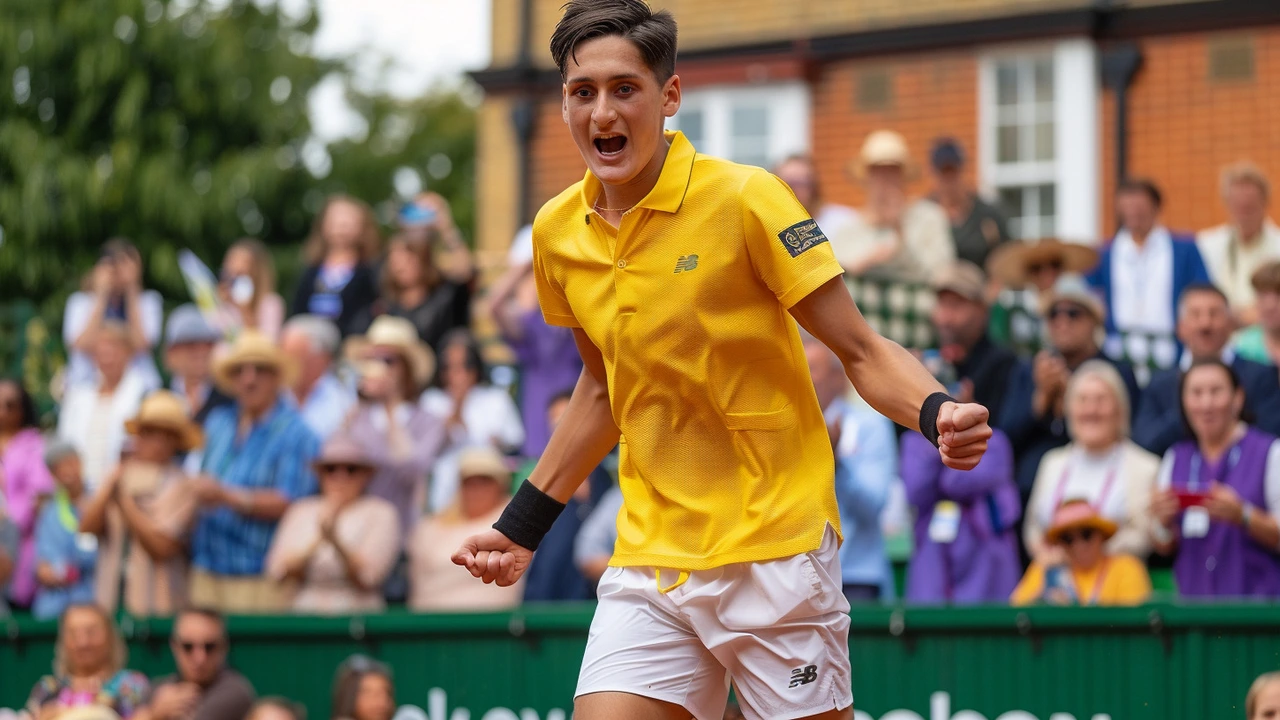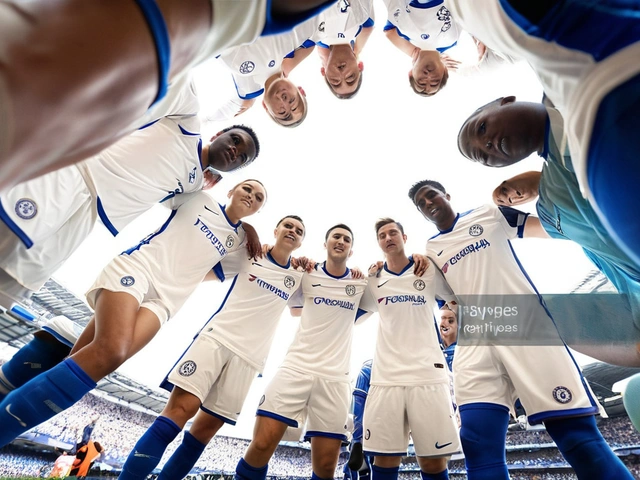Jack Draper Shocks Carlos Alcaraz at Queen's Club in Momentous Victory

Jack Draper Shocks Carlos Alcaraz at Queen's Club in Momentous Victory
In an electrifying turn of events at the Queen's Club championship, 22-year-old Jack Draper, ranked 31st in the world, achieved a stunning victory by defeating Spain's Carlos Alcaraz, the top seed and defending champion. Alcaraz, known for his prowess on both grass and clay, entered the match as the reigning Wimbledon and French Open champion, having not tasted defeat in seven weeks and remaining unbeaten on grass for nearly two years.
This extraordinary match captivated the audience as Draper not only showcased his extraordinary talent but also his resilience and tactical brilliance. The significance of this upset can hardly be overstated, as it propels Draper into an elite circle of players who have managed to disrupt the reign of top-seeded champions. Draper's performance was a masterclass in exploiting opportunities and maintaining composure under intense pressure.
The Match Breakdown
The contest opened with a fiercely competitive first set in which neither player conceded a break point, reflecting a high level of play from both sides. The set culminated in an exhilarating tie-break, where Draper held his nerve to clinch the first set, sending shockwaves through the crowd. The tension was palpable, and the crowd's energy surged as they realized they were witnessing something truly special.
The second set saw Draper break Alcaraz’s serve at a pivotal moment when he led 3-2. Alcaraz, determined to fight back, managed to save three match points, but Draper held firm. The atmosphere in the stadium reached a fever pitch as Draper finally sealed the set and the match with a powerful forehand, securing his place in the quarter-finals. This victory not only marks Draper’s most significant career win but also makes him the first British man to defeat a top-two player on grass since Andy Murray triumphed over Novak Djokovic in the 2013 Wimbledon final.
After the match, Draper expressed his gratitude for the overwhelming support from the British crowd. He also reflected on the presence of his family, including his 80-year-old grandfather, who were in attendance to witness his historic victory. In what was clearly a deeply personal moment, Draper highlighted how much it meant to have his family there to support him.
The Road Ahead
Looking ahead, Draper is set to face the fifth seed, Tommy Paul, in the quarter-finals. This upcoming match presents another significant challenge, but after toppling a giant like Alcaraz, Draper’s confidence is undoubtedly buoyed. He has demonstrated that he is not just a promising prospect, but a formidable competitor capable of standing toe-to-toe with the best in the sport.
The triumph of British talent wasn’t limited to singles play. In the doubles competition, Joe Salisbury, partnered with American Rajeev Ram, also enjoyed success. The duo managed to defeat the unseeded pair of Sebastian Korda and Alex De Minaur, adding to the triumphant atmosphere for British tennis at the Queen's Club.
For Draper, this victory is more than just a single match win—it's a significant milestone in his career, reflecting his tenacity and growth as a player. Draper’s journey has not been without its challenges, particularly as fellow Britons Andy Murray and Dan Evans have faced their own setbacks. Draper’s performance serves as a beacon of hope and inspiration for British tennis, embodying a new era of potential and promise.
A Message of Determination and Hope
Draper’s victory reinforces that success in sports often requires resilience and determination. Draper’s ability to rise to the occasion against such a formidable opponent speaks volumes about his mental and physical fortitude. His journey to this point has been marked by hard work, strategic improvement, and an unwavering belief in his abilities.
His post-match comments reflect a maturity beyond his years. Draper acknowledged the support of his team, his family, and the fans, all of whom played a crucial role in his journey to this landmark victory. He also noted the importance of staying grounded and focused, recognizing that while this victory is momentous, the road ahead is filled with more opportunities and, undoubtedly, more challenges.
The Queen's Club championship has a storied history of talent and competition, and Draper’s victory adds another thrilling chapter to its legacy. As the tournament progresses, all eyes will be on Draper to see if he can continue his remarkable run and perhaps even clinch the title. This narrative of young talent disrupting the established order is something that resonates deeply with fans, infusing the sport with excitement and anticipation.
For Jack Draper, the victory over Carlos Alcaraz at the Queen's Club is not just a win; it is a statement. It signals his arrival on the big stage and his readiness to compete with and defeat the best players in the world. This is a moment that Draper and his supporters will cherish, and it has undeniably set the tone for what promises to be a thrilling continuation of his journey in professional tennis.






Kimberly Hickam
June 21, 2024 AT 20:01When we dissect the broader implications of Draper’s triumph, it becomes evident that this match serves as a microcosm of the evolving power dynamics within professional tennis, where the traditional hierarchy is increasingly susceptible to disruption by emergent talent; the fact that Draper, at merely 22, managed to outmaneuver a player of Alcaraz’s calibre, who has been on an almost mythical unbeaten run on grass, underscores a paradigm shift that cannot be ignored. One must consider the statistical rarity of a British player breaking a top‑two seed on grass, a feat last witnessed during Murray’s 2013 victory over Djokovic, and appreciate the historical continuity that Draper now embodies. Additionally, the mental resilience displayed by Draper in the decisive moments-particularly his composure during the tie‑break and the subsequent match points-offers a case study in psychological fortitude that rivals the physical prowess typically highlighted in post‑match analyses. The strategic deployment of serve‑and‑volley tactics, combined with a calculated willingness to extend rallies in order to test Alcaraz’s baseline endurance, reflects a nuanced game plan that deviates from the baseline‑heavy style often attributed to young British prospects. Moreover, the presence of his grandfather in the stands injects an intergenerational narrative that enriches the emotional texture of the victory, reminding us that sport is as much about lineage as it is about individual achievement. From an economic perspective, Draper’s win is poised to attract a surge in sponsorship interest, potentially reshaping the financial landscape for emerging British players who have previously been eclipsed by the economic dominance of the established elite. It also raises questions about the efficacy of the current coaching frameworks employed within the LTA, suggesting that perhaps a more individualized approach, as evidenced by Draper’s recent improvements, may yield better results than broad‑stroke development programs. The ripple effects of this upset will likely permeate the upcoming quarter‑finals, where Draper’s confidence will be put to the test against Tommy Paul, a match that could either cement his newfound status or serve as a sobering reminder of the depth of the field. Finally, the collective enthusiasm of the home crowd, amplified by the dramatic narrative of a young Briton dethroning the reigning champion, should not be dismissed as mere fanfare; it represents a potent cultural moment that may inspire a new generation of players to pursue the sport with renewed vigor. In summation, Draper’s victory is a multi‑faceted event that transcends the confines of a single match scoreline, offering insights into psychological resilience, strategic innovation, historical continuity, economic implications, and cultural impact within the modern tennis milieu.
Gift OLUWASANMI
June 28, 2024 AT 04:48Yo, this is straight up fireworks on grass! Draper came in with that raw hustle, slicing Alcaraz’s rhythm like a chef dicing onions. You feel the vibe when the crowd roars every time he lands that forehand? Pure poetry in motion, bro. It’s not just a win; it’s a statement that the underdog can tango with the king and actually lead the dance. Respect to the lad for pulling off the upset without breaking a sweat.
Keith Craft
July 4, 2024 AT 13:35What a tidal wave.
Kara Withers
July 10, 2024 AT 22:21If you look at the match stats, Draper’s first‑serve percentage was notably higher than Alcaraz’s in the crucial moments, especially during the tie‑break. That consistency gave him a valuable edge, allowing him to dictate play when it mattered most. Additionally, his return game was sharp; he managed to neutralise Alcaraz’s serve on several key points, forcing errors that shifted momentum. From a coaching perspective, the ability to stay aggressive yet measured under pressure is a hallmark of a mature competitor. It's also worth noting that his footwork on the grass surface was exemplary, giving him the balance to execute precise shot placement. Overall, Draper’s performance showcases a blend of technical proficiency and mental resilience that bodes well for his upcoming matches.
boy george
July 17, 2024 AT 07:08Draper proved he belongs among the elite.
Cheryl Dixon
July 23, 2024 AT 15:55While many are dazzled by the sheer surprise of this upset, it's crucial to remember that tennis, at its core, is a game of patterns and preparedness. Draper’s victory is less a fluke and more the culmination of disciplined training, strategic foresight, and an unwavering belief in his own game plan. By dissecting Alcaraz’s tendencies-particularly his tendency to over‑commit on the forehand wing-Draper was able to exploit those openings with surgically precise shots. This illustrates the profound impact of meticulous match analysis, an often‑overlooked facet in the public narrative. Moreover, the psychological edge gained from overcoming a player of Alcaraz’s stature cannot be overstated; it fuels a confidence surge that can ripple through subsequent rounds. In the grand tapestry of British tennis, this win stitches a new thread of hope, indicating that the pipeline of talent is robust and ready to challenge the status quo.